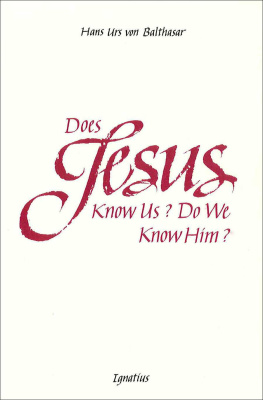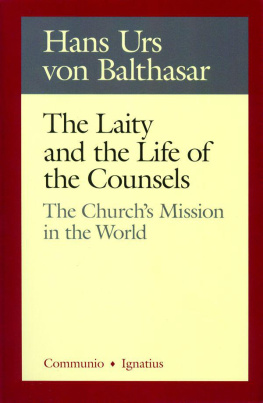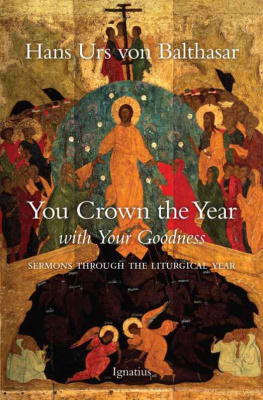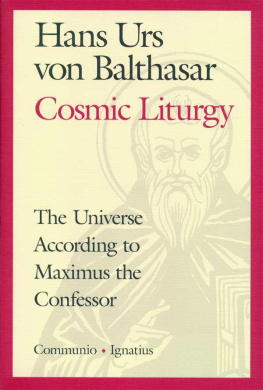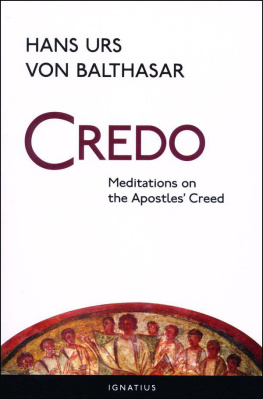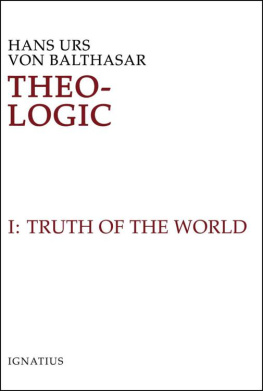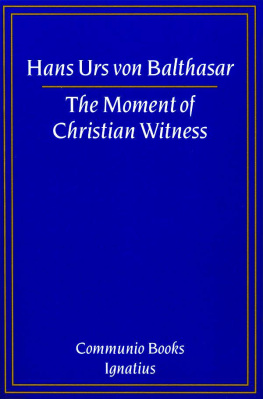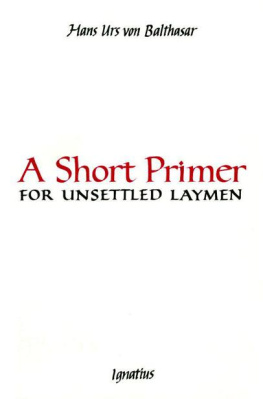Hans Urs von Balthasar - Does Jesus Know Us--Do We Know Him?
Here you can read online Hans Urs von Balthasar - Does Jesus Know Us--Do We Know Him? full text of the book (entire story) in english for free. Download pdf and epub, get meaning, cover and reviews about this ebook. year: 1986, publisher: Ignatius Press, genre: Religion. Description of the work, (preface) as well as reviews are available. Best literature library LitArk.com created for fans of good reading and offers a wide selection of genres:
Romance novel
Science fiction
Adventure
Detective
Science
History
Home and family
Prose
Art
Politics
Computer
Non-fiction
Religion
Business
Children
Humor
Choose a favorite category and find really read worthwhile books. Enjoy immersion in the world of imagination, feel the emotions of the characters or learn something new for yourself, make an fascinating discovery.
- Book:Does Jesus Know Us--Do We Know Him?
- Author:
- Publisher:Ignatius Press
- Genre:
- Year:1986
- Rating:5 / 5
- Favourites:Add to favourites
- Your mark:
- 100
- 1
- 2
- 3
- 4
- 5
Does Jesus Know Us--Do We Know Him?: summary, description and annotation
We offer to read an annotation, description, summary or preface (depends on what the author of the book "Does Jesus Know Us--Do We Know Him?" wrote himself). If you haven't found the necessary information about the book — write in the comments, we will try to find it.
Hans Urs von Balthasar: author's other books
Who wrote Does Jesus Know Us--Do We Know Him?? Find out the surname, the name of the author of the book and a list of all author's works by series.
Does Jesus Know Us--Do We Know Him? — read online for free the complete book (whole text) full work
Below is the text of the book, divided by pages. System saving the place of the last page read, allows you to conveniently read the book "Does Jesus Know Us--Do We Know Him?" online for free, without having to search again every time where you left off. Put a bookmark, and you can go to the page where you finished reading at any time.
Font size:
Interval:
Bookmark:
Does Jesus Know UsDo We Know Him?
HANS URS VON BALTHASAR
Do We Know Him?
Translated by
Graham Harrison
IGNATIUS PRESS SAN FRANCISCO
Title of German original:
Kennt uns JesusKennen wir ihn ?
1980 Verlag Herder, Freiburg in Breisgau
Cover by Victoria Hoke Lane
With ecclesiastical approval
1983 Ignatius Press, San Francisco
All rights reserved
Second printing 1986
ISBN 978-0-89870-023-7
Library of Congress Catalogue Number 82-84581
Printed in the United States of America
It is a perplexing situation. On the one hand we seem to be seeing a repetition of those biblical scenes in which Jesus is surrounded by the crowd, almost stifled and pushed into the lake: a Jesus-spirituality, both ecclesial and unecclesial, is spreading over the globe. On the other hand the exegetes keep on erecting more and more barriers, making it hard for us to approach the historical Jesus; often they try to make it impossible. In general the situation may be put like this: to a degree, people take no notice of the barriers or simply break through them, in the doubtlessly sound instinct that no Scribe can diminish the uniqueness and the day-to-day significance of the figure of Jesus. I must get to him, the simple man ( am-ha-arez ) says, for he belongs to me.
The two reflections which follow do not claim to mediate in the conflict between naive piety and scientific exegesis. But they arise from the conviction that only the Scriptures of the New Covenant, taken as witnesses of faith and in their entirety, can produce a tangible and credible portrait of Jesus Christ, whereas every critical attempt to approach him from a position other than that of the faith witnessed to in the Scriptures can only result in a pallid, distorted picture unworthy of belief (and hence devoid of interest).
It is a fact: only the person who is convinced that Jesus knows him personally gains access to knowledge of him. And only the person who is confident of knowing him as he is, can know that he is also known by him!
Hans Urs von Balthasar
Basel, January 6, 1980
Does Jesus Know Us?
Lord, you know all things
What comes into the light, is light
Acquaintance through weakness
Diagnosis
Wounded for our transgressions
The hour
Do We Know Jesus?
Considering the tradition we have received concerning Jesus, this must seem a strange question. Does not the Gospel give a positive answer on every page? Or is there perhaps a qualitative difference between the way Jesus knows us and the way others do, causing us to ask what his way is? Comparing him with other normative human beings (as Jaspers calls them) we can see that a Socrates had a deep knowledge of man: he was able to reveal, beneath the layers of superficial or merely apparent knowledge, mans profound ignorance, instanced in himself and in others, an ignorance distinguishing the human from the divine. This he did by virtue of a daimon , a quasi-divine inspiration enabling him to sense what was right and true. Buddha, equally, glimpsed the depths of man when he discovered, beneath the busy-ness which haunts him, a hidden, tormenting thirst which must be quieted if a person is to burst through the narrow, unlit prison of his ego and enter into unlimited light. But does this knowledge go far enough? Are we known in having our ignorance laid bare or by being shown a way to rid ourselves of our ego? If we include the many insights of other normative people, while each shows a different aspect of man, true up to a point, their perspectives do not match perfectly; taken together they simply reveal man as a sphinx.
On the other hand, we could point to the advances of the human sciences since the time of Jesus; surely his knowledge is archaic and primitive compared with the insight of modern psychology in all its branches and methods, of which the Gospel seems to have no intimations? Yet, leaving aside the latter issue for the moment, does not this very psychology exhibit the same confusion of tongues, since each theory and school depends upon a different conception of man? Ask Freud, Adler, Jung, Fromm and others about the meaning of human existencewhich is after all the goal of every practical measure we take in coming to grips with itand you will hear as many divergent answers.
Do we not need a ray of light from a plane higher than the human in order adequately to illuminate the riddle of man? Do we not need a light from God such as began to shine with the prophets, relentlessly laying bare what sought to remain hidden, yet not condemning it in disgust but elevating it in a helpful spirit? Jesus knowledge of man, then, could be the perfection of this light sent by God. On the one hand he ruthlessly reveals the heartas the divine Word is commissioned to do: For the word of God is living and active, sharper than any two-edged sword, piercing to the division of soul and spirit, of joints and marrow, and discerning the thoughts and intentions of the heart. And before him no creature is hidden, but all are open and laid bare to the eyes of him to whom we must give an account (Heb 4:12 f). But this light is not cold and pitiless. In describing himself as the light of the world in which we should believe, in which we should walk as long as it is day, in order to be children of the light (Jn 8:12; 12:35 f), Jesus means a gracious, sympathetic and merciful light, accompanying us gently so that we do not stumble in the dark (Jn 11:9 f).
His light both reveals and conceals. It envelops what is laid bare with the cloak of divine forgiveness; it wounds, but, like a doctor, does so in order to heal. This process indicates that the light is both human and more-than-human; it springs from a single source which, though it may have manifold effects, does not dismember man and set him against himself. Rather it draws (re-collects) him toward that unified source for which he has always been seeking, consciously or unconsciously. He is neither left standing in Socratic ignorance nor absorbed into Nirvana but irradiated as a child of the light in a way which is beyond all his own conceptions.
1. Knowledge of the heart
Lord, you know all things
All the Evangelists assert that Jesus knew mens hearts. It will suffice to recall a few of the well-known scenes.
When the lame man is lowered down before Jesus through the opened roof and Jesus first of all heals him of his sins , the Scribes ask themselves, Who can forgive sins but God alone? But Jesus perceived their questionings and answered them: Why do you question in your hearts? Which is easier, to say Your sins are forgiven you, or to say, Rise and walk? (Lk 5:17 ff and parallels).
A deaf-mute is healed and the Pharisees tell themselves that he drives out demons by the prince of demons. Knowing their thoughts , he said to them: Every kingdom divided against itself is laid waste... (Mt 12:22 ff and parallels).
One Sabbath Jesus is teaching in a synagogue where there is a man with a withered hand. The Scribes and Pharisees are watching to see whether he will heal him on the Sabbath. But he knew their thoughts and said to the man who had the withered hand, Come and stand here. Then he asks whether it is lawful to do good or harm on the Sabbath, looks around on them all and heals the sick man (Lk 6:6 ff).
The disciples are disputing about which of them is the greatest. But Jesus, who saw the thoughts of their hearts , took a child and placed him in their midst, and said: Whoever is the smallest among you, is great (Lk 9:46 f).
The long chain of direct and indirect prophecies and intimations of his corning suffering also includes the knowledge of his betrayer : One of you will betray me, one who is eating with me... who is dipping bread in the same dish with me (Mk 14:18, 20). He also refers to the betrayers wretched end.
Next pageFont size:
Interval:
Bookmark:
Similar books «Does Jesus Know Us--Do We Know Him?»
Look at similar books to Does Jesus Know Us--Do We Know Him?. We have selected literature similar in name and meaning in the hope of providing readers with more options to find new, interesting, not yet read works.
Discussion, reviews of the book Does Jesus Know Us--Do We Know Him? and just readers' own opinions. Leave your comments, write what you think about the work, its meaning or the main characters. Specify what exactly you liked and what you didn't like, and why you think so.

